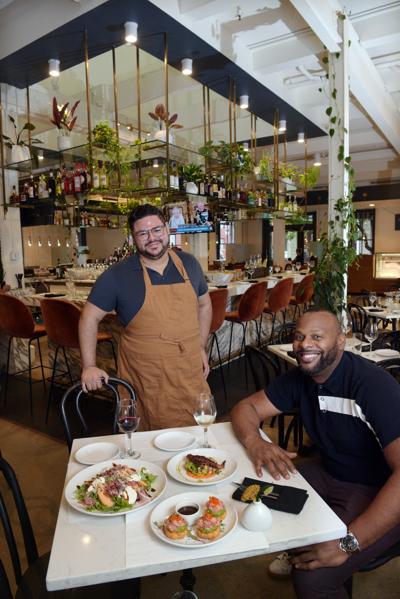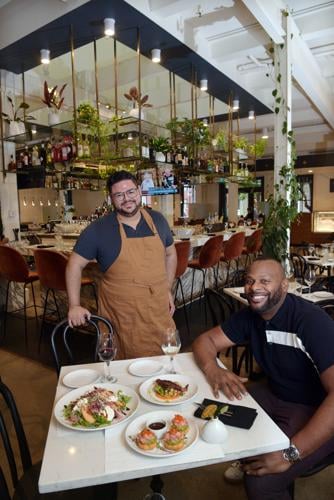When Jamal Wilson decided to get in the food hall business in 2017, he wanted to offer a different experience, swapping out what can feel like a shopping mall food court visit for a relaxing, full-service, sit-down restaurant meal.
Enter The Hall, the up-market concept he opened first in Tampa, followed by Orlando, and as of Aug. 16, in New Orleans at 801 Magazine St. in the former Auction House Market space. “We had planned to open in New Orleans in 2025, but when the space became available, it was too good to pass up,” Wilson says. He plans to open two more locations in the Atlanta area this fall.
“When I was traveling around the country checking out food halls, I’d end up looking for a table, carrying little boxes that light up and number sticks to show what I ordered. I loved the diversity of the food, but wanted to be waited on,” says Wilson, 46, whose background straddles professional basketball and the mortgage and real estate businesses.
After selling his mortgage company and spending time at home for a few years, flipping houses and raising his two boys, now 7 and 9, Wilson missed working with a team. The food halls spoke to his real estate expertise. “I didn’t have the restaurant background, but I knew I could find smart people to handle that,” he says.
With corporate executive chef Diego Ulin overseeing culinary operations and Babatu Sparrow in place as company operations director, Wilson’s concept has flourished. The Hall on Mag features a beautiful central bar, six culinary concepts and spaces for private events spread over 8,800 square feet.
“Because we opened so quickly — just a month and a half after signing the lease — we didn’t have time to bring local chefs on board,” he says. “August also isn’t a great month for business. The plan is to bring local chefs into the mix in November or December. I want them to be set up to succeed.”
Currently, diners can order from all vendors off a single menu, choosing from a range of cuisines. At the modern Italian concept Amato Italia, pristine ingredients riff off the popular prosciutto and melon combo, with the addition of creamy burrata and spicy arugula, all drizzled with a balsamic reduction. Its hefty portion is enough for two to share, which is true of many dishes at The Hall.
At Ja Nai, Japanese street food-inspired options include crispy pot stickers with chili crisp, chicken lettuce wraps, and spicy tuna piled onto a crispy fried rice cake with a crown of tobiko glistening on top. Diners can get chicken pot pie with a cheddar crust or pot roast from American Culture. The Mediterranean concept El Greco offers flaming saganaki and phyllo-wrapped prawns. Itzayana serves Ulin’s version of crispy fried tacos from when he had his own food truck and stand at The Hall in Orlando. Puffy tacos embrace the likes of braised adobo beef with birria dipping sauce, carnitas and chicken with garlic crema. South & Common focuses on Southern fare.
“The idea behind food halls was that a group of friends could all get different kinds of food,” Wilson says. “For me, I like to eat a variety, some sushi, a taco, a salad. So, it works for a solo diner, too.”
The menu is organized by cuisine, each with small plate options. In the center, offerings range from the raw bar’s oysters to salads and main dishes like miso-glazed salmon, a foie gras burger and Greek seafood pasta. Small plates and sandwiches range from $6 tacos to a $28 lobster roll. Main courses are $22 to $30. Servers take your order, and there’s no fiddling with your phone and QR codes. Dishes are coursed like in any restaurant.
Larkin and Gonzales told us about how the food has changed at Oktoberfest, the Deutsches Haus' kitchen and what to drink this year.
The Hall on Mag is a welcoming space, with plenty of natural light and a manageable noise level, even during a busy lunch hour. Wilson’s design team warmed up the monochromatic interior with deep blue walls, added leather seating and a scattering of flat-screen TVs.
Introducing local chefs is the next step.
“Our business model is straightforward,” Wilson says. “Chefs pay a membership fee, with all expenses split evenly between the six or however many kitchens there are. They know what their costs are going to be each week, covering labor, utilities, management. Our location in Orlando is on track to break $7 million in sales in its first year. For a lot of our chefs, making the kind of money they can make out of a 300-square-foot space is life-changing.”




